13+ Sample Sales Agency Agreement
-
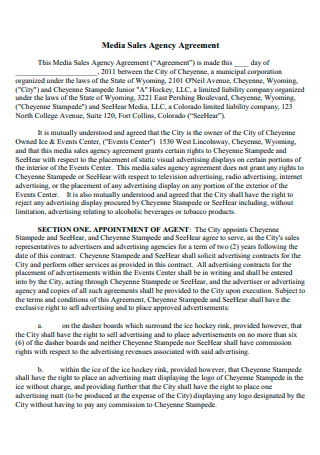
Media Sales Agency Agreement
download now -
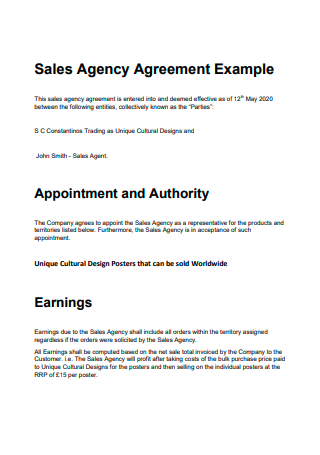
Sales Agency Agreement Example
download now -
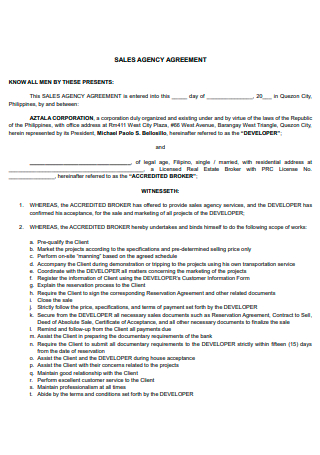
Basic Sales Agency Agreement
download now -
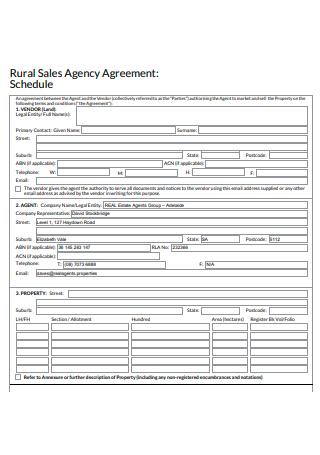
Rural Sales Agency Agreement Schedule
download now -
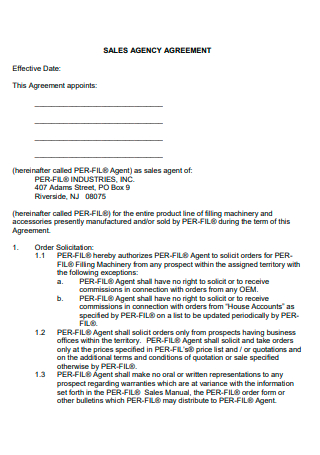
Formal Sales Agency Agreement
download now -
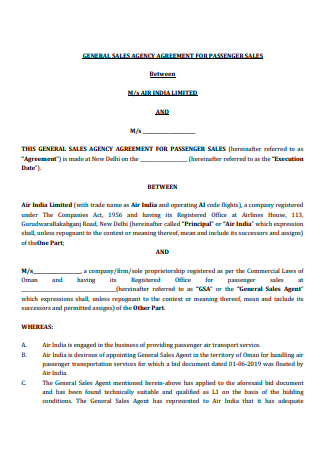
General Sales Agency Agreement
download now -
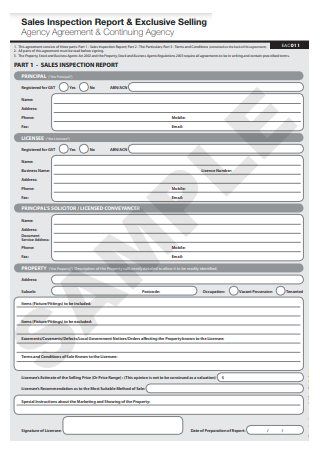
Sample Sales Agency Agreement
download now -
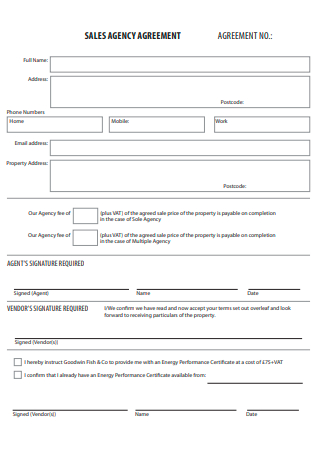
Sales Agency Agreement Format
download now -
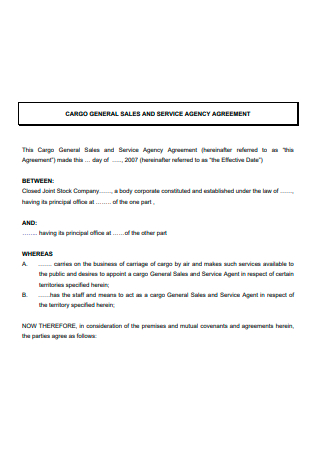
General Sales and Service Agency Agreement
download now -
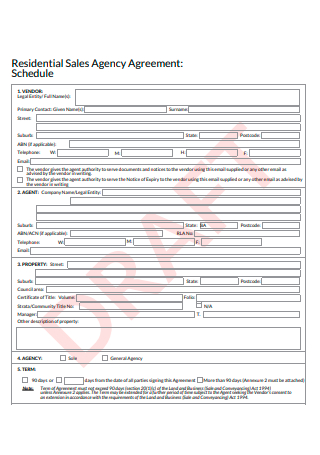
Residential Sales Agency Agreement Schedule
download now -
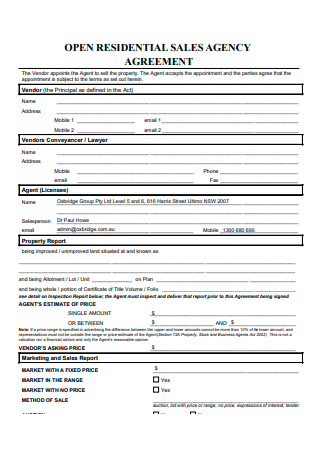
Open Residential Sales Agency Agreement
download now -
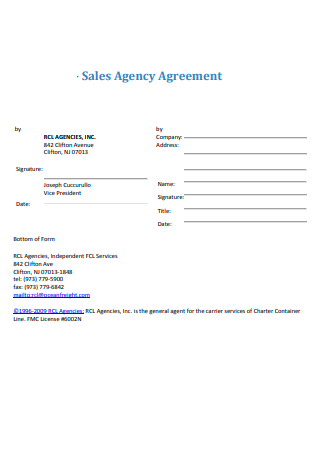
Simple Sales Agency Agreement
download now -
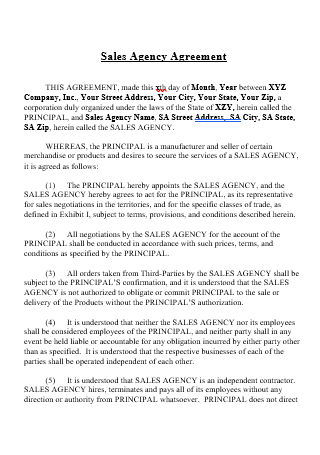
Standard Sales Agency Agreement
download now -
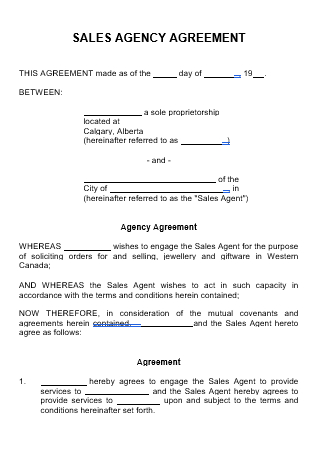
Sales Agency Agreement in DOC
download now
FREE Sales Agency Agreement s to Download
13+ Sample Sales Agency Agreement
What Is a Sales Agency Agreement?
Important Components of a Sales Agency Agreement
Different Types of Sales Agents
Steps in Creating a Sales Agency Agreement
FAQs
What role does a sales agent have?
Does a sales agent have restrictions in selling products?
What is the comparison between a non-exclusive agency and an exclusive agency?
What Is a Sales Agency Agreement?
Prior to defining a sales agency agreement, perhaps we should get familiarized with what a sales agency is first. In simple terms, a sales agency is a type of business that specializes in promoting the sales of goods or services of a particular company. The said company can make use of the services of a sales agency to let them take full control of their sales activities or to enhance its in-house sales force.
A sales agency agreement is a business document that is used to employ the services of a sales agent to negotiate and sign a contract of sale on behalf of a principal. It also specifies the parameters that the sales agent will abide by if he/she works as an independent contractor for a corporation. Moreover, this document also outlines the rationale for appointing an agent, the obligations of the principal and agent, the minimum sale objectives, the value of the commission that the sales agent will receive, and the methods for payment and termination of the agreement. It also clearly establishes that the sales representative is not a firm co-owner, employee, or officer.
Important Components of a Sales Agency Agreement
Discussed below are the important elements that should be included when making a sales agency agreement:
Different Types of Sales Agents
Sales agencies employ sales agents to do their tasks, such as selling their products or services to the general public. With that being said, here are the different types of sales agents:
Steps in Creating a Sales Agency Agreement
A sales agency agreement is made between a company that manufactures its own goods or services and a sales agency that wishes to sell and promote those goods in a specific area. With that being said, here are the steps to be taken when writing a sales agency agreement:
-
1. Write the Introductory Elements of the Agreement
Begin the sales agency agreement by writing the introductory details such as the parties involved in the agreement and their specific responsibilities, the title of the agreement, the nature of the business, as well as the region in which the sales agency will sell and promote the goods and services of the partner company. A definition of terms section of the agreement is not strictly required, but can always come in handy to avoid confusion regarding the complex business or legal terms that may be written anywhere in the agreement.
-
2. Set the Scope of the Agreement
After writing the introductory elements, this step will then define the scope of the sales agency agreement. In this step, write the elements such as the responsibilities that the sales agency will have throughout the duration of the agreement, the terms regarding the commission of the sales agents, the procedure regarding the sale of the products or services as well as the procedures post-sale, and any other additional requirements that the parties involved may have throughout the duration of the agreement.
-
3. Write Down the Additional Clauses of the Agreement
In this step, you will write down the additional clauses of the sales agency agreement. The additional clauses of the agreement generally include the trademark clause, the confidentiality clause, and the indemnification clause. Additionally, the duration of the sales agency agreement should also be stated in this step, which includes a concrete start date and finishing date. Indemnification clauses are especially important in this agreement since it states that the partner company will pay and indemnify any claims, losses, or damages resulting from patent infringements.
-
4. Set the Termination and the Rights Clause
After writing down the auxiliary clauses of the agreement, it is now time to define the termination clause and the property rights clause of the sales agency agreement. A termination clause is important to have in this agreement (or on any type of agreement) since it clearly defines all the situations or guidelines that can initiate the termination of the sales agency agreement. Having a property rights clause is also important in this agreement since it states that even though the sales agencies have permission to sell and distribute the partner company’s products and services in their area, they are not permitted to take ownership of the products of the company.
-
5. Finalize the Sales Agency Agreement
After writing all the primary and auxiliary elements of the sales agency agreement, it is now time that the agreement should be finalized. Add spaces for signatures in the document, verify if there are any elements of the agreement that are missing, and check for typographical or grammatical errors that may have been unnoticed. An important step you can do here is to have the document checked by a lawyer since this is a legal paper. Once everything is in order, then the parties involved can give it another careful reading before they sign the sales agency agreement. Once they sign the agreement, the terms stated inside that document will then take effect.
FAQs
What role does a sales agent have?
The role of a sales agent is to sell items or services while also acting as a representative for the brand of the company that hired him/her in a particular area. Sales agents are frequently self-employed individuals who receive a commission depending on the volume of products or services that they have sold. Some sales agents work for sales agencies that subcontract their employees. However, both agency and non-agented salespeople can provide services dependent on the sort of sales you may require to enhance income.
Does a sales agent have restrictions in selling products?
Yes, restrictions can also be in place for sales agents. For example, a supplier or the partner company can prohibit a sales agent from selling competitive items from another company in the agreed-upon region for the duration of the agreement or for a period of time after the agreement expires. A supplier may also require an agent to give a guarantee payment that protects the supplier if a buyer fails to make a payment and may prohibit the agent from exceeding an expense limit in a specific period of time.
What is the comparison between a non-exclusive agency and an exclusive agency?
In a non-exclusive agency, the partner company has the power to appoint other agents in a given territory, and the agents must compete with each other in order to promote and close sales of the product. Typically, the territory is defined as the geographical region in which the agent is assigned to work. In an exclusive agency, the parent company grants a sole agent the only right to sell their products in an area, and the parent company promises not to appoint other agents in the same territory.
A straightforward and effective sales agency agreement should contain the necessary terms and clauses that are needed to protect a partner company with a product or service to sell as well as the sales agent that does the work. This agreement document also ensures that all the parties involved comply with the laws in the area that they’re operating. In this article, various examples of a sales agency agreement can be obtained if you need help in making one.
